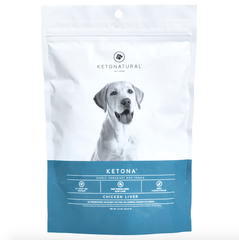Save Money, Save Your Dog.
Join Our Email List For Discounted Pricing and a Free Guide to the Science of Keto Dog Food.
Does High Protein Consumption Exacerbate or Contribute to the Development of Canine Renal Disease?
Original White Paper can be viewed here
Abstract
It has been theorized that “excessive” protein consumption by healthy adult dogs exacerbates and contributes to the occurrence of kidney disease. In this white paper we briefly examine the evidence supporting this hypothesis and conclude that it has no meaningful evidentiary support.
EVIDENCE REVIEW
Dietary protein restriction has long been considered a folk remedy for treating dogs suffering from urinary problems such as progressive renal failure and renal insufficiency. Some advocates of protein restriction also claim that reducing dietary protein consumption can help to prevent renal disease. Such ideas were even endorsed in the 1972 edition of the National Research Council of the National Academy of Sciences’ Nutrient Requirements of Dogs and Cats, although the endorsement was later dropped and has not been reinstated.
These theories seem to date to rodent experiments conducted in the 1920s, which found that rats fed high protein diets developed more severe age-related renal lesions than those who consumed less protein. In the decades that followed these original studies, other experiments also documented a link between protein consumption and a number of kidney-related physiological markers (such as renal blood flow and glomerular filtration rate) in dogs.
But the scientific community’s understanding of the significance of these markers has changed significantly in the past eighty years. And over this time the relationship between protein consumption and renal function in dogs has been tested directly through a variety of experiments as well. In each case, the results failed to support the hypothesis that high protein consumption impairs renal function. Dogs with preexisting moderate renal failure have been shown to adjust to high-protein diets with no ill effects and dogs with 75% of their kidney mass surgically removed suffered no ill effects when fed a high-protein diet (more than 50% of calories from protein) for more than four years, just to highlight two specific cases.
For a more detailed overview of the experimental evidence on these issues, we strongly recommend a recent evidence review published by Dr. Kenneth Bovee of the University of Pennsylvania School of Veterinary Medicine (Bovee 1999). Bovee considers ten recent experiments testing the link between protein consumption and canine renal function and concludes that the belief that protein restriction benefits kidney function is nothing more than a “medical myth.”
Bovee’s perspective is echoed in the most recent nutrient profiles developed by both the American Association of Feed Control Officials and the National Research Council (the two most authoritative American sources of evidence-based nutritional guidelines for dogs and cats), neither of which impose any kind of safe upper limit on protein consumption by adult dogs. Moreover, as explained in greater detail elsewhere in this white paper series, we note that the domestic dog’s genetic ancestors consumed far more protein than most modern pets for more than 99% of their evolutionary heritage, a fact which strongly suggests that the physiology of the domestic dog is well-suited to a high protein diet.
OVERALL SUPPORT FOR PRIMARY THESES
1/10: Very limited body of historical evidence from other animal models; roundly undercut by a long history of species specific experimental evidence and a more refined understanding of canine renal physiology.
REFERENCES
[1] Bayliss et al. 1933. “The Excretion of Protein by the Mammalian Kidney.” Journal of Physiology. 77(4):386-98.
[2] Bovee, K.C. 1991. “Influence of Dietary Protein on Renal Function in Dogs.” Journal of Nutrition. 121 (11S):128-39.
[3] Bovee, K.C. 1999. “Mythology of Protein Restriction for Dogs with Reduced Renal Function.” Supplement to Compendium on Continuing Education for the Practicing Veterinarian. 21(11-K):15-20.
[4] Finco et al. 1994. “Effects of Aging and Dietary Protein Intake on Uniephrectomized Geriatric Dogs.” American Journal of Veterinary Research. 55(9):1282-90. Does High Protein Consumption Exacerbate or Contribute to the Development of Canine Renal Disease? Evidence Review Scientific Advisory Committee, KetoNatural Pet Foods COPYRIGHT 2017 © KETONATURAL PET FOODS, INC. 2
[5] Robertson et al. 1986. “Long-Term Renal Responses to High Dietary Protein in Dogs With 75% Nephrectomy.” Kidney International. 29(2):511-19.
